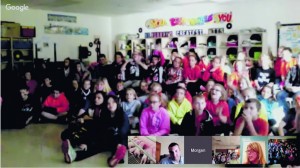
For some students, access to a local farm is not always easy to come by. Between biosecurity issues and location, the gap between producers and consumers continues to grow. The Ohio Pork Council is overcoming these challenges by using technology to get more students “on the farm” through a virtual field trip to an Ohio pig farm project.
“Our farmer members placed priority on member and classroom education,” said Jennifer Osterholt, director of marketing and education, Ohio Pork Council. The most popular requests from schools were wanting to take a class field trip to a farm, she explained. Unfortunately, a majority of the schools interested were not located in an area close enough to a farm, and biosecurity risks also limit the children’s exposure.
Technology
“We started looking at technology and what is in the best interest of the kids and the farmers,” said Osterholt. “We landed on the Google Hangouts platform.” Google Hangouts allows classrooms to live stream tours of Ohio hog operations through YouTube, as well as join in on the conversation — while never leaving their classrooms.
Field trips
The Pork Council held five events after launching the project in March 2015 and have tried to offer at least one presentation a month in the 2015-2016 school year. Age groups range from elementary students, who are excited to see a pig for possibly the first time, to high school agriculture education students who have more advanced questions about health care and management.
Opening the classroom
Don Jones, agriculture education teacher from Harrison Central High School in Cadiz, said his seventh-grade class was in the middle of learning about the pork industry when he received an email about the field trips. “We do have some kids that work on operations like that, but it is a limited number,” said Jones. Even for high school kids in an agricultural community, biosecurity makes it difficult for students to get that kind of exposure, he said.
Schwab farm
Lauren Schwab, of Schwab Family Farm, in Somerville, led elementary students from Malinta, College Corners, Pataskala and Van Wert on a recent virtual tour of her family’s hog operation. Schwab shared how they manage pigs from birth to weaning age before sending them off to another farm for finishing.
As farrowing house manager, she said her favorite part is checking in on each piglet, making sure it is healthy and the sows are comfortable. She showed the students piglets nursing, snuggled up under heat lamps and bouncing around their pens.
Questions
While she walked around the farrowing house, students were able to ask questions by webcam or by typing their questions into the live chat system. They had questions about the size of the pigs, the breed of pigs and what they eat and drink.
“So far the most difficult questions have been, ‘where do baby pigs come from?’ and ‘how do you tell the difference between boys and girls?’,” Osterholt said.
“We are very willing to be transparent,” but some things are better left up to the parents, she said. High school students tend to ask more questions regarding health care, feed rations and management practices on the farm, Osterholt said.
Feedback
So far, Ohio Pork Council has done virtual presentations of four Ohio hog farms and has reached more than 30 classrooms through its live event. Participating farms included: Tom Graham of Frazeysburg, Ohio; Neil Rhonemus, of Lynchburg, Ohio; Lauren Schwab, of Somerville, Ohio; and Jeff Wuebker, of Versailles, Ohio.
“The feedback has been overwhelmingly positive,” said Osterholt. She admitted, there were times when she held her breath waiting for the reviews to come back on days that technology was being less than cooperative — creating pixelated images or delayed responses — but, “they just continue to say how exciting it is to look at the pigs,” she said.
Some classrooms even witnessed the live birth of piglets, which Osterholt said is exciting for students, teachers and the farmers. The feedback from farmer participants has been positive as well. “They all want to promote agriculture,” said Osterholt. “There is some set-up ahead of time,” she said, but a lot less is required than planning for a bus load of students to come to the farm.

Growing interest
Since it’s launch, 88 schools with a total of 3,330 students have signed up for the virtual field trips. And even more have tuned into the Pork Council’s YouTube channel to watch previously recorded tours. Starting in April, the Wisconsin Pork Association will be launching their own version of the trips. So will the Kansas Pork Association, which will hold its first trip for a teacher workshop in June.
Tech support
Not sure your classroom has the right equipment for a virtual tour? All you need is a webcam and an internet connection. Dan Toland, of Wilt PR, has been playing the role of tech support, helping classrooms get Gmail accounts set up and practicing live videos before the event. Archives of previous tours are also available online for those who can’t make it to a live event.
“The kids really enjoyed it. I would do it again,” said Jones. “The Pork Council is doing a good job getting the word out.” He added it would be nice to see other commodity groups holding similar tours.
Plan a virtual field trip
For field trip information and a link to previous field trips, visit the Ohio Pork Council. To schedule a classroom field trip, contact Jennifer Osterholt at josterholt@ohiopork.org, or call 614-882-5887.
STAY INFORMED. SIGN UP!
Up-to-date agriculture news in your inbox!












